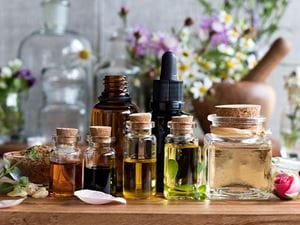
There is a lot of confusion and disagreement among Christians regarding essential oils. Are they New Age? Witchcraft? What about the physical and mental health claims about them?
Essential oils were a part of everyday life for prophets, kings, queens, the disciples, and even Jesus Christ. However, how they were used and how they were viewed is very important in understanding how as Christians today we can now use them.
Here are the benefits, and the cautions, we as Christians should understand before using essential oils in our home.
What are essential oils and aromatherapy?
Aromatherapy is a branch of alternative medicine that uses plant extracts, especially those with odor, to treat medical and psychological ailments. Despite the name, these extracts (also known as "essential oils") can either be administered by inhalation or applied directly to the skin. Aromatherapy is used to treat skin conditions, congestion, and infection. Essential oils like lavender are also used to aid relaxation. Besides the effective use of peppermint in freshening breath, there is no scientific evidence that aromatherapy actually has a medical benefit, and many essential oils can be dangerous if administered incorrectly. Despite this, they have grown quiet a bit in popularity over the last decade and are being used by families all across the nation regularly.
Does the Bible mention essential oils?
The Bible mentions aroma and incense extensively. In Exodus 30:22-33, God instructs the Israelites to make anointing oil with myrrh, fragrant cane, cinnamon, and cassia (similar to cinnamon) in a medium of olive oil. The next passage describes the incense to be used in the tabernacle and, later, the temple, including spices, onycha, galbanum, and frankincense. Frankincense was also to be added to the grain offering (Leviticus 2:1-2) as a "soothing aroma to the LORD." The wise men brought frankincense and myrrh to the young Jesus (Matthew 2:11), and Mary washed Jesus' feet in nard, an extremely costly ointment, "and the house was filled with the fragrance of the perfume" (John 12:3).
In the time of the Old Testament, plant-based medication was viewed with ambivalence. Its use was so closely linked with pagan religious practices that it wasn't encouraged by Scripture. Instead, the Israelites were to rely on God as their Healer (Exodus 15:26; Jeremiah 46:11). Priests were authorized to identify ailments but not to treat them (Leviticus 13:7, 19, 49). The anointing oil prescribed in Exodus 30 was used to dedicate people and things for God's service. Frankincense and myrrh were used in embalming. Lastly, while nard may have a pleasant aroma, there is nothing to indicate a medical benefit to Jesus' feet beyond deodorizing.
When can it be bad to use essential oils?
There are many times where essential oils can pass over from just being a simple item, and instead turn into one that takes you away from the Lord. While many people could benefit from the use of essential oils, most of the times the sales pitches for them are way over the top. Some distributors cross the line big time when it comes to this and elevate the essential oils to be more magical than they actually are. Christians need to be careful that we don’t elevate the body in a way that is unbiblical. We should take care of ourselves through exercise (1 Timothy 4:8), healthy eating, and taking medicine as needed. We must always remember that we are mortal creatures and our time here on earth is short though (Psalm 39:5). Essential oils are not going to cure all of your ailments and should not be put on a pedestal.
Secondly, there has been an increasing trend where people who sell essential oils do so out of their home churches, in what are called “essential oil parties.” Rather than having a party in their own home, or the home of another distributor, having such meetings in a church offers added benefits. There is plenty of space, a captive audience, and it is all under the guise of Christianity. This, however, should cross the lines of ethics for Christians. The church building is a means to facilitate conversation about Christ, worship Him, and be nourished by His blessings. In the Bible, Jesus drives out money changers from the temple, not once but twice. Jesus said, “My house shall be called a house of prayer, but you have made it a den of robbers” (Luke 19:46). When we use the church building, we need to understand our motives and rethink why we would have someone sell product inside of them.
Lastly, people who use and sell essential oils tend to get very passionate about them. The people of God already have a higher calling to be a witness (Acts 1:8) and ambassador (2 Corinthians 5:20) for Christ. Everywhere we go, we should be promoting Him and His Word, trying to each others of the amazing benefits we receive when we choose to accept Christ. Christians daily forget this higher calling, and replace it very easily with a passion for something else, such as essential oils. People begin to be a witness and ambassador for a product, not for God. Without even knowing it, people use Christ rather than be used by Him. Every chance they have, they promote their business and product. When it is convenient, they will use the name of Christ, but it is only as a means to an end. Their goal is not the advance of the gospel, but personal gain.
Essential oils are derived right from the earth and are a part of God’s natural creation. However like with most things, when taken out of context or used without moderation and regulation it can cross the line and be a tool that takes us further away from God. We should use these oils knowing that they can be helpful, but are not what will save us in the end. That responsibility lies with Jesus Christ.

